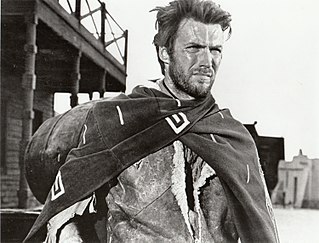
The spaghetti Western is a broad subgenre of Western films produced in Europe. It emerged in the mid-1960s in the wake of Sergio Leone's filmmaking style and international box-office success. The term was used by foreign critics because most of these Westerns were produced and directed by Italians.

They Call Me Trinity is a 1970 spaghetti Western comedy film written and directed by Enzo Barboni and produced by Italo Zingarelli. The film stars the duo of Terence Hill and Bud Spencer as half-brothers Trinity and Bambino, who help defend a Mormon settlement from Mexican bandits and the henchmen of the land-grabbing Major Harriman. It was filmed on location in Campo Imperatore, Abruzzo, Italy, with financial backing from West Film.
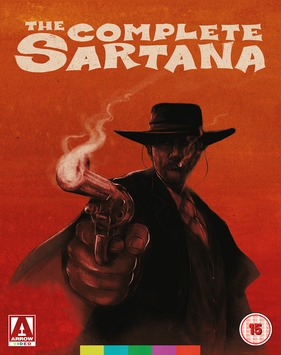
Sartana is a series of Spaghetti Western films which follows the adventures of the title character, a gunfighter and gambler who uses mechanical gadgets and seemingly supernatural powers to trick his rivals. The series features five official entries: If You Meet Sartana Pray for Your Death (1968), I am Sartana, Your Angel of Death (1969), Sartana's Here… Trade Your Pistol for a Coffin, Have a Good Funeral, My Friend... Sartana Will Pay and Light the Fuse... Sartana Is Coming. The first film was directed by Gianfranco Parolini, with the remaining four directed by Giuliano Carnimeo. Sartana is portrayed by Gianni Garko in all films in the series except for Sartana's Here… Trade Your Pistol for a Coffin, in which he was portrayed by George Hilton.

Giuliano Gemma was an Italian actor. He is best known internationally for his work in Spaghetti Westerns, particularly for his performances as the title character in Duccio Tessari's A Pistol for Ringo (1965), Captain Montgomery Brown/'Ringo' in Tessari's The Return of Ringo (1965), the title character in Michele Lupo's Arizona Colt (1966), Scott Mary in Tonino Valerii's Day of Anger (1967) and Michael "California" Random in Lupo's California (1977).
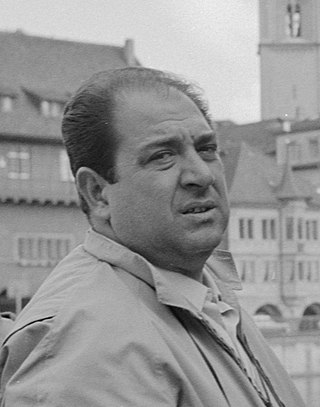
Enzo Barboni, sometimes credited by his pseudonym E.B. Clucher; the surname of his grandmother, was an Italian film director, cinematographer and screenwriter, best known for his slapstick comedies starring Terence Hill and Bud Spencer.
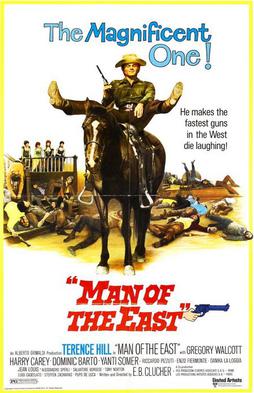
Man of the East is a 1972 Italian Spaghetti Western film directed by Enzo Barboni starring Terence Hill.
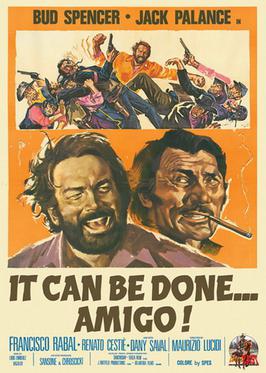
It Can Be Done Amigo is a 1972 Spanish / Italian / French spaghetti western film directed by Maurizio Lucidi.

Trinity Is Still My Name is a 1971 Italian Spaghetti Western comedy film directed by Enzo Barboni. Starring the film duo of Terence Hill and Bud Spencer, it is a direct sequel to They Call Me Trinity (1970). It was shot extensively in Campo Imperatore, Abruzzo. It was the highest-grossing Italian film to that point in time. In 1995, a sequel was made, Sons of Trinity, as a continuation of the Trinity series.

Speaking of the Devil is a 1991 Italian comedy film directed by Enzo Barboni. It was the last collaboration between Barboni and Bud Spencer with the pairs sons co-writing the film together; Spencer's daughter also plays a role in the film.

Even Angels Eat Beans is a 1973 Italian comedy film written and directed by Enzo Barboni with Giuliano Gemma and Bud Spencer. It was awarded with the Golden Screen Award in 1974.

The Unholy Four, also known as Chuck Mool, is a 1970 Italian Spaghetti Western. The film represents the directorial debut of Enzo Barboni, who was, until then, a respected cinematographer. He replaced Ferdinando Baldi, who was fired by the producer Manolo Bolognini because of his insistence in wanting to engage the actress Annabella Incontrera in the role of Sheila.

Charleston is a 1974 Italian buddy comedy film written and directed by Enzo Barboni. The film is the sequel of Even Angels Eat Beans, with Ricky Bruch who replaced Bud Spencer as Giuliano Gemma's support.

Tedeum is a 1972 Italian Spaghetti Western film directed by Enzo G. Castellari. The title role was initially offered to Tomas Milian, who eventually refused.

Johnny Hamlet (Italian: Quella sporca storia nel West, lit. 'That Dirty Story in the West' is a 1968 Italian film directed by Enzo G. Castellari. The film is a Spaghetti Western version of William Shakespeare's tragedy Hamlet.
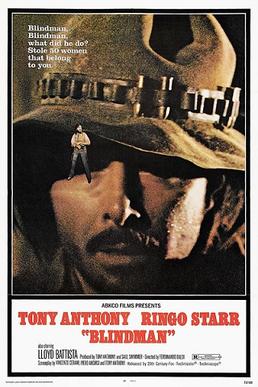
Blindman is a 1971 Spaghetti Western film directed by Ferdinando Baldi and co-written and co-produced by Tony Anthony. The film's protagonist, played by Anthony, is an homage to Kan Shimozawa's Zatoichi character: a blind transient who does odd jobs and is actually a high-skilled warrior.

Two Sons of Ringo is a 1966 Italian western-parody film starring the comic duo Franco and Ciccio. It was the last film directed by Giorgio Simonelli who, for health reasons, left the production just before the end of filming and was replaced by Giuliano Carnimeo.

Buddy Goes West is a 1981 Spaghetti Western comedy film directed by Michele Lupo.

Zorro and the Three Musketeers is a 1963 Italian comedy-adventure film directed by Luigi Capuano and starring Gordon Scott.

More Dollars for the MacGregors is a 1970 Spaghetti Western film directed by José Luis Merino and starring Peter Lee Lawrence, Carlos Quiney and Malisa Longo.

Carambola's Philosophy: In the Right Pocket is a 1975 Italian comedic Spaghetti Western film co-written and directed by Ferdinando Baldi. Starring the duo Michael Coby and Paul L. Smith, a couple formed by producer Manolo Bolognini with the purpose of copying the successful films of the duo Terence Hill and Bud Spencer. It is the sequel of Carambola!.



















